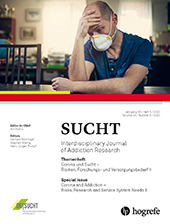SARS-CoV-2 Pandemie und Suchterkrankungen: Schwerpunkt Opioidabhängigkeit und Substitution
Ein Erfahrungsbericht aus Bayern
Abstract
Zusammenfassung.Hintergrund: Die Auswirkungen der SARS-CoV-2 Pandemie betreffen Menschen mit Suchterkrankungen auf vielfältige Weise. Psychosoziale Stressoren wie die Sorge vor Ansteckung oder die Folgen der öffentlichen und privaten Kontaktbeschränkungen können zu Destabilisierung, Rückfällen oder Zunahme eines Substanzkonsums führen. Gleichzeitig sind stationäre, ambulante oder rehabilitative Versorgungsangebote nur noch begrenzt verfügbar. Besonders vulnerabel sind Personen mit Opioidabhängigkeit, die aufgrund der hohen psychischen und somatischen Komorbiditätsraten eine erhöhte Infektanfälligkeit aufweisen und im Rahmen einer Substitutionsbehandlung zwingend auf stabile ambulante Versorgungsstrukturen angewiesen sind. Ziel: Es werden am Beispiel der Erfahrungen in Bayern die Auswirkungen auf Opioidabhängige und die Substitution dargestellt. Schlussfolgerungen: Um die Folgen des Lockdowns für diese Patient_innen zu minimieren und das Betreuungsangebot verlässlich aufrechtzuerhalten sind verschiedene Vorgehensweisen in Betracht zu ziehen, die neben allgemeinen Hygieneschulungen der Betroffenen, Anpassungen der Ambulanzorganisation ebenso wie regulatorische Maßnahmen umfassen.
Abstract.Background: The covid-19 pandemic challenges patients with severe mental illnesses in many aspects. Curfews, quarantine and isolation are stressors that impair mental wellbeing and can lead to increases in substance use or relapse in patients with substance use disorders. Among the latter, patients with opioid use disorder are particularly vulnerable due to high prevalence of psychiatric or somatic comorbidities. On the other hand, both availability and access to health care is limited during the pandemic, which severely affects patients under opioid maintenance therapy (OMT). Aim: This report focusses on the Bavarian experience with opioid dependent patients and OMT. Conclusions: Measures to counteract the health risks for this group of patients require the maintenance of OMT facilities under safe conditions in terms of service, hygiene and risk of infection.
Literatur
(2020). Alcohol use and misuse during the COVID-19 pandemic: a potential public health crisis? Lancet Public Health, 5(5), e259.
(2020). COVID-19 and addiction. Diabetology & Metabolic Syndrome, 14(5), 817–823.
(2020). Die Covid-19-Pandemie als idealer Nährboden für Süchte. Deutsches Ärtzeblatt, 117(25), A1251–1254.
(2020). Psychiatrische Aspekte einer Pandemie. Der Neurologe & Psychiater, 21, 28–31.
(2007). Stress, dysregulation of drug reward pathways, and the transition to drug dependence. American Journal of Psychiatry, 164(8), 1149–1159.
(2020). Community mental health care delivery during the COVID-19 pandemic: Practical strategies for improving care for people with serious mental illness. Community Mental Health Journal, 19, 1–11. Epub ahead of print. doi: 10.1007/s10597-020-00662-z.
(2009). Long-term psychiatric morbidities among SARS survivors. General Hospital Psychiatry, 31(4), 318–326.
(2020). Physical health among people with serious mental illness in the face of COVID-19: Concerns and mitigation strategies. General Hospital Psychiatry, 66, 30–33.
(2009). Krankheitslast und Versorgungsniveau bei opioidsubstituierten Patienten. Medizinische Klinik – Intensivmedizin und Notfallmedizin, 104, 913–917.
(2020). The COVID-19 pandemic and its impact on substance use: Implications for prevention and treatment. Psychiatry Research, 289, 113096. Epub ahead of print. doi: 10.1016/j.psychres.2020.113096.
(2020). Covid-19 und Substitution. Suchtmedizin, 22, 119–121.
(2020). Collision of the Covid-19 and addiction epidemics. Annals of Internal Medicine, 173(1), 61–62.
(2020). Immediate psychological responses and associated factors during the initial stage of the 2019 coronavirus disease (COVID-19) epidemic among the general population in China. International Journal of Environmental Research and Public Health, 17(5), 1729.
WHO-IASC Reference Group on Mental Health and Psychosocial Support (MHPSS) in Emergency Settings (2020, February). Interim Briefing Note; Addressing mental health and psychosocial aspects of covid-19 outbreak, version 1.5 (Circulated on: 17 March 2020). Verfügbar unter https://interagencystandingcommittee.org/iasc-reference-group-mental-health-and-psychosocial-support-emergency-settings/interim-briefing.



